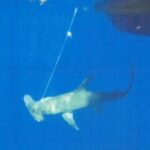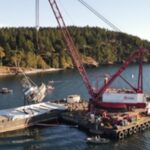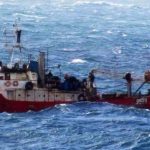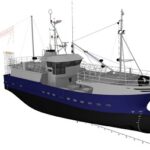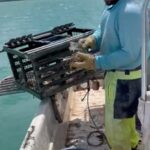Daily Archives: November 8, 2016
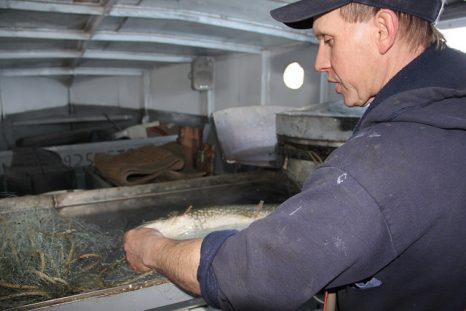
Wisconsin’s Dwindling Commercial Fisheries Contend With A Farmed Future
Kevin Anschutz has been commercial fishing in Lake Michigan for the last 40 of his 50-year life. “We’ve been fishing since way before we were old enough to drive,” he says. Anschutz learned the lifestyle from his father and now fishes with his older brother. The two operate Anschutz Fisheries in Baileys Harbor, Wis. On this spring afternoon the lake sparkles, reflecting sunshine. Anschutz steers his boat away from shore and into the blue water. The color of his eyes, baseball cap, t-shirt and denim all match the lake. He lights a cigarette. Anschutz has witnessed both fish populations and commercial fisheries in the lake decline. He says 40 years ago there were nearly 150 fishermen, but today in Wisconsin he estimates there are 30 left.Historically, a long list of fish were caught and consumed from the Great Lakes including sturgeon, herring and trout. Read the story here 17:53
John Corbin, commercial fisherman and crabber, describes the challenges of the business
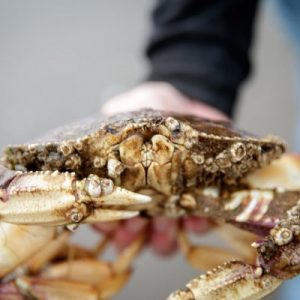 Delivering tasty crustaceans to crab lovers has been John Corbin’s life work. He’s been involved with fishing one way or another since he was a high school student in Astoria. In 1989, he and three friends started a commercial fishing business—Buck & Ann Fisheries—with crab as one of its main pursuits. Although Corbin spends most of his time in an office these days, he describes the typical scene on a crab boat. When the season starts in December or January, a boat drops 900 wire mesh crab pots throughout the ocean. Each is marked with a buoy and tracked by GPS. “In the beginning of the season, we just kind of throw them out in different places,” he said. “You have your favorite spots, spots where you did well last year or think you might do well this year. Then, as you start picking them up, you find you’re totally wrong. You move to where you’re doing well, or you just go to another beach somewhere and lay them out.” Read the story here 16:01
Delivering tasty crustaceans to crab lovers has been John Corbin’s life work. He’s been involved with fishing one way or another since he was a high school student in Astoria. In 1989, he and three friends started a commercial fishing business—Buck & Ann Fisheries—with crab as one of its main pursuits. Although Corbin spends most of his time in an office these days, he describes the typical scene on a crab boat. When the season starts in December or January, a boat drops 900 wire mesh crab pots throughout the ocean. Each is marked with a buoy and tracked by GPS. “In the beginning of the season, we just kind of throw them out in different places,” he said. “You have your favorite spots, spots where you did well last year or think you might do well this year. Then, as you start picking them up, you find you’re totally wrong. You move to where you’re doing well, or you just go to another beach somewhere and lay them out.” Read the story here 16:01
Peconic Bay scallop season off to a slow on Long Island
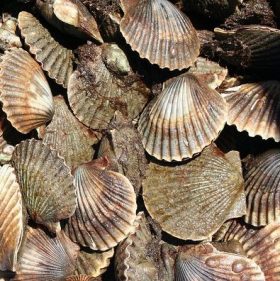 Long Island fishermen are saying that it’s a challenging year for Peconic Bay scallops, with the first day’s harvest “less than half” of what it was last year, said manager Keith Reda at Braun Seafood Co. in Cutchogue. The season begins on the first Monday of November and runs through the end of March. By late afternoon Monday, Reda hadn’t seen a Peconic Bay scallop yet. “They’re still out there, looking,” he said of the shop’s fisherman suppliers. The Seafood Shop in Wainscott was preparing on Monday to sell its first three bushels, the harvest from the first of the shop’s five fishing boats that left docks around sunrise. The Seafood Shop will sell bay scallops for about $29 a pound if the supply is slim and $25 if it’s plentiful — or as demand falls after the New Year and the water gets especially cold. Read the rest here 14:44
Long Island fishermen are saying that it’s a challenging year for Peconic Bay scallops, with the first day’s harvest “less than half” of what it was last year, said manager Keith Reda at Braun Seafood Co. in Cutchogue. The season begins on the first Monday of November and runs through the end of March. By late afternoon Monday, Reda hadn’t seen a Peconic Bay scallop yet. “They’re still out there, looking,” he said of the shop’s fisherman suppliers. The Seafood Shop in Wainscott was preparing on Monday to sell its first three bushels, the harvest from the first of the shop’s five fishing boats that left docks around sunrise. The Seafood Shop will sell bay scallops for about $29 a pound if the supply is slim and $25 if it’s plentiful — or as demand falls after the New Year and the water gets especially cold. Read the rest here 14:44
Coast Guard on scene of yacht, lobster boat collision 10 miles East of Block Island
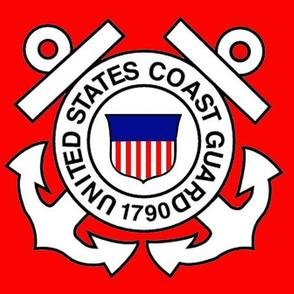 The Coast Guard is responding to a vessel collision about 10 miles east of Block Island this morning. The captain of the 40-foot lobster boat, Squeeze Play, used a VHF radio to contact Coast Guard Sector Southeastern New England watchstanders and report Squeeze Play and the yacht, Lucia, had collided. It was reported Squeeze Play had a crew of two, and Lucia had four people aboard. The yacht was also reported to have a hole in its bow, so the crew of the Squeeze Play helped the four people transfer from Lucia to their lobster boat. The yacht is sinking, according to a press release issued by the Coast Guard. After arriving on scene, the boat crew from Station Point Judith transferred the crew members from Lucia to the 45-foot response boat and are bringing them back to port. The Squeeze Play is returning to port as well. It is unclear what time the collision occurred. link 11:30
The Coast Guard is responding to a vessel collision about 10 miles east of Block Island this morning. The captain of the 40-foot lobster boat, Squeeze Play, used a VHF radio to contact Coast Guard Sector Southeastern New England watchstanders and report Squeeze Play and the yacht, Lucia, had collided. It was reported Squeeze Play had a crew of two, and Lucia had four people aboard. The yacht was also reported to have a hole in its bow, so the crew of the Squeeze Play helped the four people transfer from Lucia to their lobster boat. The yacht is sinking, according to a press release issued by the Coast Guard. After arriving on scene, the boat crew from Station Point Judith transferred the crew members from Lucia to the 45-foot response boat and are bringing them back to port. The Squeeze Play is returning to port as well. It is unclear what time the collision occurred. link 11:30
Western Australias Fishing industry’s elder statesman had salt in his blood
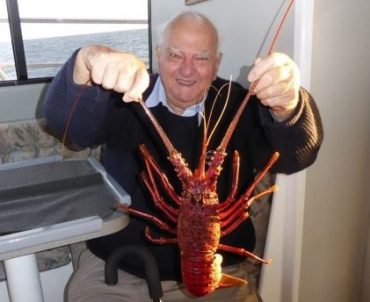 Commercial fishing’s elder statesman, Edward ‘Ted’ Laurence Collins, would be remembered as much for his generosity and support of the fishing industry as his broad physique honed from breaking underwater swimming records as a school boy in Marlborough. Born in Blenheim, Collins lived all his life in Marlborough, settling in Spring Creek with his wife, Gwen, and daughters Jan and Sue, and son Peter. He began work as a farmer but soon followed his passion to become a commercial fisherman and fishery advocate during a period of great change in the industry which included the introduction of the quota management system, and the establishment of the exclusive economic zone. He spent more than 50 years involved in the fishing industry as a selfless advocate for commercial fishing, and sustainable fishery management while earning the respect of many inside and outside the industry. Read the rest here 11:09
Commercial fishing’s elder statesman, Edward ‘Ted’ Laurence Collins, would be remembered as much for his generosity and support of the fishing industry as his broad physique honed from breaking underwater swimming records as a school boy in Marlborough. Born in Blenheim, Collins lived all his life in Marlborough, settling in Spring Creek with his wife, Gwen, and daughters Jan and Sue, and son Peter. He began work as a farmer but soon followed his passion to become a commercial fisherman and fishery advocate during a period of great change in the industry which included the introduction of the quota management system, and the establishment of the exclusive economic zone. He spent more than 50 years involved in the fishing industry as a selfless advocate for commercial fishing, and sustainable fishery management while earning the respect of many inside and outside the industry. Read the rest here 11:09
Russian fishermen find massive surprise in their net
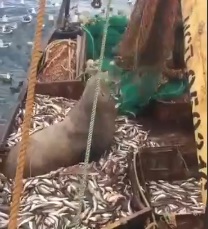 The crew of a Russian fishing boat got a very big surprise when they pulled up their catch from the watery depths. As the net is raised, one of the fisherman can be heard saying, [translated] “I don’t think there’s anything interesting.” He was wrong. When they released their net, they found plenty of fish, and one massive, and presumably very full, sea lion. The fishermen attempt to goad the unwelcome passenger back into the sea by spraying it with a hose and giving it a few jabs with a broom. They seem to realize their attempts to shoo the enormous creature away are utterly futile, and let the lumbering giant take its time. “Dive already!” one of the fisherman says as the animal lingers on the edge of the boat. Watch the video here 10:28
The crew of a Russian fishing boat got a very big surprise when they pulled up their catch from the watery depths. As the net is raised, one of the fisherman can be heard saying, [translated] “I don’t think there’s anything interesting.” He was wrong. When they released their net, they found plenty of fish, and one massive, and presumably very full, sea lion. The fishermen attempt to goad the unwelcome passenger back into the sea by spraying it with a hose and giving it a few jabs with a broom. They seem to realize their attempts to shoo the enormous creature away are utterly futile, and let the lumbering giant take its time. “Dive already!” one of the fisherman says as the animal lingers on the edge of the boat. Watch the video here 10:28
Down East area reopened to shellfish harvesting as level of biotoxin fades
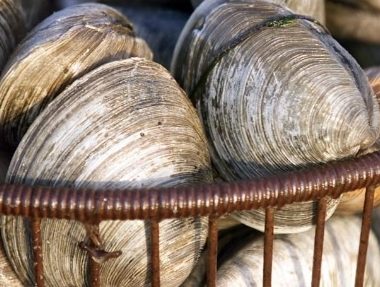 The Maine Department of Marine Resources has given the all-clear for Down East shellfish harvesters, more than a month after closing the region to harvesting because of an unusual bloom of toxic algae. On Monday, the DMR announced it was reopening harvesting areas between Penobscot Bay and Machiasport for shellfish, including softshell clams and mussels. Areas farther east, between Machiasport and Calais, were reopened to harvesting Oct. 25. The entire Down East coast from east Penobscot Bay to the Canadian border was closed at the end of September. The closure was triggered after shellfish samples from Jonesport, Corea and Roque Bluffs tested positive for elevated levels of domoic acid, a biotoxin that can cause amnesic shellfish poisoning and lead to illness, brain damage and possibly death. Read the story here 09:59
The Maine Department of Marine Resources has given the all-clear for Down East shellfish harvesters, more than a month after closing the region to harvesting because of an unusual bloom of toxic algae. On Monday, the DMR announced it was reopening harvesting areas between Penobscot Bay and Machiasport for shellfish, including softshell clams and mussels. Areas farther east, between Machiasport and Calais, were reopened to harvesting Oct. 25. The entire Down East coast from east Penobscot Bay to the Canadian border was closed at the end of September. The closure was triggered after shellfish samples from Jonesport, Corea and Roque Bluffs tested positive for elevated levels of domoic acid, a biotoxin that can cause amnesic shellfish poisoning and lead to illness, brain damage and possibly death. Read the story here 09:59
5 British Columbia Salmon Runs That Were Awesome This Year
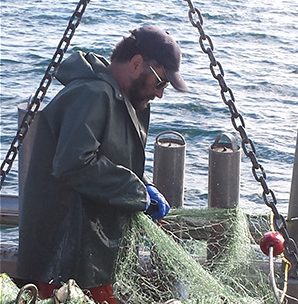 The media loves a bad news story. All summer and fall, you probably saw headlines like “‘Grim’ Fraser River salmon runs even worse than forecast” and “Low B.C. salmon stocks prompt consumer warning.” With headlines like this, it’s easy to start to wonder if we should even be eating BC salmon. There’s no doubt that there are some serious conservation issues to be addressed here and attention needs to be paid to the causes of the decline of salmon in some areas. But the reality is that BC has a large coast and many salmon runs are doing better than they have in years. To give you a sampling, here are 5 salmon runs in BC that were really strong in 2016! Read the story here 09:26
The media loves a bad news story. All summer and fall, you probably saw headlines like “‘Grim’ Fraser River salmon runs even worse than forecast” and “Low B.C. salmon stocks prompt consumer warning.” With headlines like this, it’s easy to start to wonder if we should even be eating BC salmon. There’s no doubt that there are some serious conservation issues to be addressed here and attention needs to be paid to the causes of the decline of salmon in some areas. But the reality is that BC has a large coast and many salmon runs are doing better than they have in years. To give you a sampling, here are 5 salmon runs in BC that were really strong in 2016! Read the story here 09:26
Britain’s fishing industry voted overwhelmingly to leave the EU – now it feels ‘betrayed’ by May’s Brexit proposals
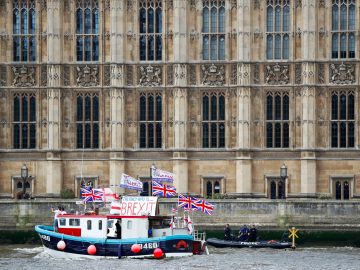 Britain’s £1-billion fishing industry, which voted overwhelmingly to leave the EU, says it feels “betrayed” by the current course of Brexit negotiations. A poll before the referendum suggested 92% of fishermen would vote to leave the EU, but many are now worried about Theresa May’s plan to roll over the EU’s much-maligned Common Fisheries Policy (CFP) into UK law. The CFP sets rules for how many fish each EU country’s boats can land. Several politicians have warned that dropping the policy will not benefit the industry, but most fishermen disagreed, believing that its restrictions are the cause of a rapidly declining UK fleet. But Prime Minister Theresa May intends to introduce a ‘Great Repeal Bill’ in the wake of Brexit, which will roll over all EU law into UK law – including the CFP. Alan Hastings, a spokesman for Brexit campaign group ‘Fishing For Leave,’ told Business Insider that the proposal risks “throwing the industry under a bus.” “It’s the equivalent of being told you’re leaving prison and then being told you’re actually staying. If we adopt the CFP, it will squander the opportunity that Brexit provides to rebuild the UK fishing industry,” he said. Read the story here 08:28
Britain’s £1-billion fishing industry, which voted overwhelmingly to leave the EU, says it feels “betrayed” by the current course of Brexit negotiations. A poll before the referendum suggested 92% of fishermen would vote to leave the EU, but many are now worried about Theresa May’s plan to roll over the EU’s much-maligned Common Fisheries Policy (CFP) into UK law. The CFP sets rules for how many fish each EU country’s boats can land. Several politicians have warned that dropping the policy will not benefit the industry, but most fishermen disagreed, believing that its restrictions are the cause of a rapidly declining UK fleet. But Prime Minister Theresa May intends to introduce a ‘Great Repeal Bill’ in the wake of Brexit, which will roll over all EU law into UK law – including the CFP. Alan Hastings, a spokesman for Brexit campaign group ‘Fishing For Leave,’ told Business Insider that the proposal risks “throwing the industry under a bus.” “It’s the equivalent of being told you’re leaving prison and then being told you’re actually staying. If we adopt the CFP, it will squander the opportunity that Brexit provides to rebuild the UK fishing industry,” he said. Read the story here 08:28
Commission likely to keep Gulf of Maine shrimp fishery closed
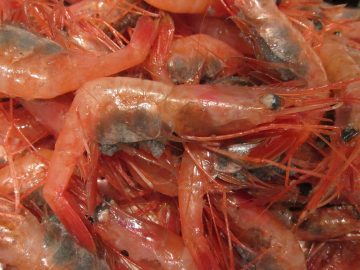 A board of the regulatory Atlantic States Marine Fisheries Commission is set to decide Thursday whether fishing will be allowed this year. A committee of scientists has advised the board it’s not a good idea, with temperatures off New England inhospitable to the shrimp. Spencer Fuller, a shrimp and lobster buyer with Cozy Harbor Seafood in Portland, said his company was once the largest processor of Maine shrimp in the country, and it has suffered. He said that he is prepared for another year of closure, but that it will send residual troubles through Maine’s seafood industry. The commission is also working on a plan for how to manage the fishery if or when reopening happens, Appelman said “If the fishery opens back up again, which we hope it does, we can’t have a free-for-all on all these shrimp,” he said. “This is how to make sure the pressure on this weak population isn’t too much for it to handle right off the bat.” Read the story here 08:05
A board of the regulatory Atlantic States Marine Fisheries Commission is set to decide Thursday whether fishing will be allowed this year. A committee of scientists has advised the board it’s not a good idea, with temperatures off New England inhospitable to the shrimp. Spencer Fuller, a shrimp and lobster buyer with Cozy Harbor Seafood in Portland, said his company was once the largest processor of Maine shrimp in the country, and it has suffered. He said that he is prepared for another year of closure, but that it will send residual troubles through Maine’s seafood industry. The commission is also working on a plan for how to manage the fishery if or when reopening happens, Appelman said “If the fishery opens back up again, which we hope it does, we can’t have a free-for-all on all these shrimp,” he said. “This is how to make sure the pressure on this weak population isn’t too much for it to handle right off the bat.” Read the story here 08:05


































